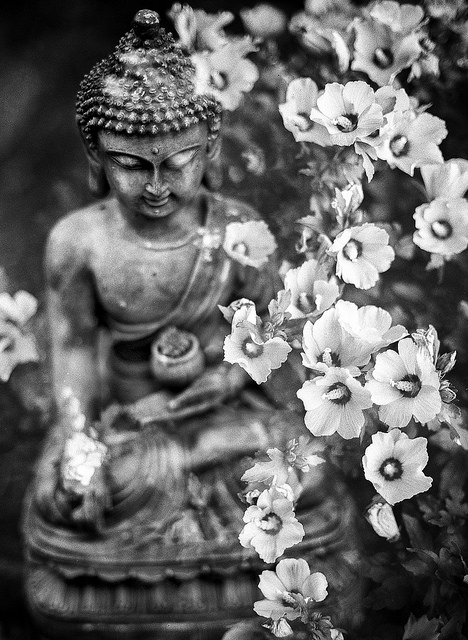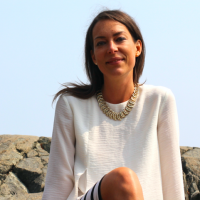Refuge is a word that I have repeated hundreds of times. It is a word that is part of a Buddhist mantra I have said almost daily for years.
However, without knowing the power a word holds, we can overlook the peace it might provide for us. We can also be blind to the state or place that word is meant to invoke for us to rest in.
What I have learned in working with this word is that refuge is also a commitment. It is a dedication to making the continual choice to find solace in this very moment, rather than in the next one that might follow. In my Buddhist practice, we try to be present with ourselves and our lives as they are—and to use our current state of being to wake ourselves up. What this means is that when we use the word “refuge” in Buddhism, we are choosing to find refuge in each thing that we do.
Refuge is not a destination; it becomes a way of being.
As humans, it seems only natural that we look for comfort and safety outside of ourselves. Our culture, and even our biology, is designed to seek comfort from our exterior circumstances and stimuli. It seems also that our nature to always look for more and more of what might feel good, which is not something to criticize so much as become aware of—as often, by doing so, we devalue our current experience.
Many of us reach a point in the journey of our lives when we realize that nothing outside of ourselves creates lasting joy, peace, or love. We then awaken to the realization that because all exterior circumstances, people, and places are temporary, we must find a better solution for our own comfort and our refuge.
The reason I began practicing spirituality—and specifically Buddhist meditation—was that I was suffering greatly. I had tried many cures for what seemed to ail me, and not many of them stuck—or if they did, they were a band-aid solution to my pain. The pain I am speaking about is the simple suffering of being a human (and a highly sensitive one at that). The interesting thing is that often when the pain is inside of us, the medicine can be found there too.
When I first heard the word refuge at a Shambhala meditation center in my early twenties, my reaction to it was to pull away. The thought of surrendering myself and my pain to something by committing to it frightened me deeply. The refuge that was being referenced at this meditation was taking refuge in the three jewels, a major preliminary practice in Buddhism that is meant to support us on our path.
The “Three Jewels” practice is at the heart of Buddhism, and it is what started me on my journey of wrestling with the notion of refuge. As the three jewels, we pledge to take refuge continually in both the Buddha, the dharma and the sangha. These three terms are described in a general sense as meaning truth, teachings, and community.
As I worked more and more with my own refuge vows, as with most things in Buddhism and the spiritual path in general, the meaning and impact of them grew and enriched my life. What I began to see was that the three jewels actually represented our human experience here fully.
What taking refuge also began to represent for me was that I had the personal ability to connect to comfort, guidance, and peace at every moment and in every aspect of my daily life. Refuge then became something of great value to me.
Refuge is not just a Buddhist practice. It is something that I believe we all need. No one is immune from suffering on this planet, and many of us carry around internal pain that we don’t know how to ease. Perhaps, becoming still and quiet for a moment, we all could find that place of sanctuary to live from.
On a recent retreat, I wrote this poem on refuge, dedicated to those of us who struggle with it:
Refuge is a practice.
Perhaps it is a movement of sweetness and breath and way of being too.
Refuge: it is also a choice.
Although we will spend years trying to find it elsewhere, rather than right here.
Refuge: we also all will need.
That safety and comfort of a home beyond home.
We wanderers and artists and lovers, we will find it—as will all of us—for it is what that yearning is always looking to receive.
Refuge: it is a place to trust as well.
So long we might seek to know it outside, but one day, we might ask if it may reside elsewhere.
So strive and grasp; we will work so hard to construct it.
Then, someday not too far in the future, we will realize the simplest of truths.
Refuge is something that was always meant to begin from within our own selves.
We still our bodies, instead of running.
And, we trust what crosses our path, instead of choosing another one.
We learn to believe in the strength within us that is indestructible.
Refuge has just always been waiting for us to claim it.
So, let’s get close to our self, the one that is right here, and cuddle up to that place that can’t be argued with anymore.
For refuge, we now have within.
And, it is refuge that is calling us home.
May we each realize that place of refuge—and may we repeatedly work with it until it makes sense to us what refuge can be. Outside circumstances will always alter our path; within us, though, is the place we might find lasting peace.
~
Relephant:
How to Find Refuge when the World feels like a Scary Place.
3 Buddhist go-to’s for the Shaky Days.
~
Author: Sarah Norrad
Image: Flickr/Benjamin Balázs
Editor: Yoli Ramazzina
Copy editor: Catherine Monkman






Read 0 comments and reply